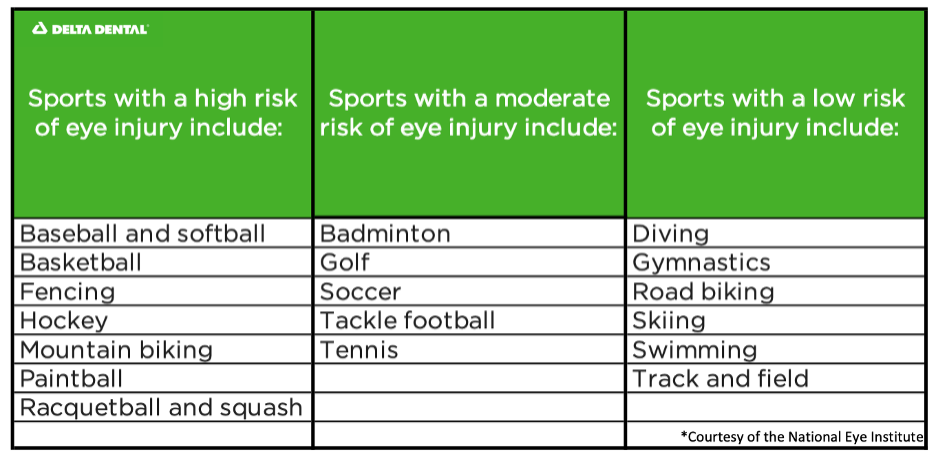The Importance of Eye Protection when Playing Sports
Posted on June 22, 2022 in Vision Health
.png)
*Updated April 2024
Athletes know the importance of protecting their bodies when playing sports. Helmets, pads, and mouthguards are just a few of the items used to keep them safe. When it comes to vision and eye protection however, there tends to be less concern.
Sports that risk eye injury
What sports come to mind when you think of eye injuries? Skiing, snowboarding, and baseball probably come to mind, but there are other activities like basketball, hockey, boxing, and soccer that also present risks to the eyes.
Here are some sports that have varying risk factors of eye injury:

Eye protection prevents sports-related eye injuries
Sports-related eye injuries are more common than many people think. In fact, in 2021, there were more than 30,000 sports-related eye injuries in the United States alone, according to the American Academy of Ophthalmology.
Here are some of the types of eye injuries that can occur when playing sports without proper eye protection:
Corneal Abrasion: Corneal abrasions occur when the cornea, or “the clear, protective ‘window’ at the front of the eye," is scratched or injured. This tends to happen when an object such as a pebble, dirt, toys, or a ball hits the eye.
Hyphema: Hyphema is bleeding in and around the eye, usually after being struck by something. If this appears, it’s crucial to seek medical care immediately.
Black Eye: A black eye occurs after an impact with the eye causes the surrounding tissue to bruise.
Fractures: Fractures occur when one or more bones surrounding the eye are broken. This is usually caused by a significant impact. Orbital fractures can cause severe damage to the eye, so going to see an eye doctor is imperative.
Eyelid laceration: Eyelid lacerations are scratches or cuts that occur on the eyelid. If this happens, have an eye physician examine the cornea, pupil, and retina to make sure the laceration doesn’t impair vision.
Most sports should feature eye protection
Unfortunately, many sports don’t require eye protection. But parents and players may want to add it to their list of safety items to protect their vision.
Some sports, such as paintball and fencing, run a high risk of eye injury and require participants to wear eye protection. However, others such as hockey, baseball, and softball often don’t require eye protection. Unfortunately, significant injuries can occur if a player takes a fast-moving object to the eye.
Sports such as biking, skiing, snowboarding, and swimming have a lower injury risk, but that doesn’t mean eye protection isn’t a good idea. Bikers should wear eye protection to prevent small items such as rocks or sand from entering their eyes. Skiers and snowboarders get multiple benefits from wearing goggles. Goggles prevent debris and wind from getting into their eyes, and many types also protect against the sun.
Eye protection can also help prevent infections in some cases. Swim goggles protect against chlorine, bacteria, and other chemicals from entering the eye. These chemicals can cause irritation and other medical problems in the eye.
Choosing the right eye protection
The best way to protect your vision is to choose the correct protective gear. Different types of sports glasses and goggles are available for reasonable prices.
Here are some of the most common options:
Sports glasses: Also known as “rec specs”, sports glasses are more common in sports with limited contact or a lower intensity.
Sports goggles: More commonly used in sports with high speeds and the potential for contact. This is because sports goggles stay on your face much better than sports glasses.
Pro tip: Sports goggles and sports glasses can often be customized with prescription lenses. Be sure to talk with a vision specialist for more information.
Lastly, it’s crucial that whatever type of eye protection you get fits correctly. Protective eye gear that doesn’t fit properly may not provide adequate protection and may compromise your vision, which could result in serious injury.
Looking for more information on keeping your eyes healthy? Check out, “5 Ways to Improve Your Eye Health”.